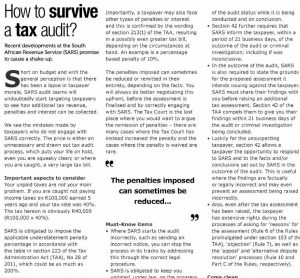For taxpayers who don’t engage with the SA Revenue Service (SARS) correctly, the price is either an unnecessary, drawn-out tax audit process or, if you’re caught, a very large tax bill.
Consider these aspects:
Your calculation is probably wrong
If you’re caught not paying income taxes on R100 000 earned five years ago and your tax rate was 40%, the tax on it is R40 000 (R100 000 x 40%). However, SARS has to impose the applicable understatement penalty percentage according to the table in Tax Administration Act (TAA), which could be 200%.
The act adds interest at the prescribed annual rate (currently 10.25%), so where SARS raises an additional tax assessment expect an initial tax bill of R140 500 (R40 000 tax + R80 000 understatement penalty + R20 500 interest for five years), which increase for a long as you’re non-compliant.
There may be other penalties or interest. An example is percentage-based penalty of 10%. The penalties can sometimes be reduced or remitted entirely. You’ll always do better negotiating this before the assessment’s finalised and be correctly engaging with SARS. The Tax Court is the last place you’d want to argue remission of penalties.
Ensure you’re protected
- If SARS starts the audit incorrectly, such as sending an incorrect notice, you can stop the process by the correct legal procedure.
- SARS must keep you updated by law, on an audit’s progress. If it’s started an audit and has not updated you every 90 days, tax law gives taxpayers the advantage.
- There are checks and balances to protect taxpayer rights. If SARS wants to do an audit, verification or inspection, section 42 of TAA puts the onus on SARS to keep the taxpayer informed of the status of the audit it’s done. SARS must inform the taxpayer within 21 business days of the outcome of the audit or criminal investigation.
- In the outcome of the audit, SARS must state the grounds for the proposed assessment in intends issuing. It must share its findings with you before raising an additional tax assessment. It must give you its findings within 21 business days of the audit or criminal investigation being concluded. Section 42 allows a taxpayer the opportunity to respond to SARS and to the facts/conclusions set in the audit outcome.
- Even after the tax assessment has been raised, the taxpayer has the right to ask for reasons, make an objection and appeal alternative dispute resolution processes. The best defence is to come clean before being audited. Once it has started, you can’t claim the relief under section 227 of the TAA od TAA for coming clean.
Author: Natasha Wilkinson, Attorney at Tax Consulting SA
For more information, please send us an email below:
[contact-form-7 id=”3875″ title=”Contact Form – SARS Audit: How to Survive”]
![2025-logo-[Recovered] Tax Consulting South Africa](https://www.taxconsulting.co.za/wp-content/uploads/2025/01/2025-logo-Recovered.png)








